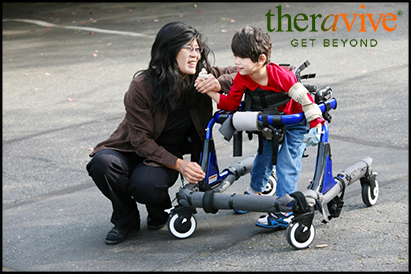 Parenthood becomes more challenging than ever when it comes to dealing with children with developmental delays. It is not only frustrating for the child but parents also have to protect their child from the piercing eyes of the world. It is difficult for children to understand why they can’t do simple things that other children of their age can do easily. This is the reason that children with developmental delays have poor communication and interaction skills (Ramous, 2008).1
Parenthood becomes more challenging than ever when it comes to dealing with children with developmental delays. It is not only frustrating for the child but parents also have to protect their child from the piercing eyes of the world. It is difficult for children to understand why they can’t do simple things that other children of their age can do easily. This is the reason that children with developmental delays have poor communication and interaction skills (Ramous, 2008).1
However, with the right parenting strategy, parents can boost the confidence of their children and help them overcome their weaknesses. This blog post will guide readers about the various types of developmental delays in children and highlight some useful parenting tips to help parents deal with children with learning disabilities.
What is Developmental Delay?
In a research article published by University of Michigan Health Systems and written by Boyse (2010)2 development delay is defined as a mental and physical disability due to which a child can’t accomplish his/her developmental objectives at the right age. Developmental delay can be major or minor depending upon the extent of disability. However, if a child is suffering from temporary learning disabilities that can be cured then it won’t be considered as a developmental delay.
In an information guide for parents published by the Educational Resource Centre, the Royal Children’s Hospital (2009), 3 doctors follow strict guidelines for diagnosing developmental delay in children, as temporary lag and major/minor learning disabilities are characterized by same symptoms but have different treatments. This is the reason that it might take more than one visit for physicians to figure the type of developmental delay. However, parents are strictly guided to immediately consult a child health expert if they suspect that their child is not progressing at a normal pace.
Types of Developmental Delays
Hoopes, Adams & Alexander, PLC (2009)4 published an article about developmental delays, in which readers are informed about various forms of developmental delays. It is very important for parents to have adequate knowledge about different cognitive and other learning disabilities to provide their children with the right treatment at the right time.
Here are some of the most frequently encountered developmental delays that impact learning abilities and cognitive skills of children:
1. Reception-Transmission Developmental Delays
Learning Rx (2014), 5 an authentic child care center declared that there are certain developmental delays caused due to improper functioning of transmission and reception neurons. However, these delays can be overcome to some extent by improving the cognitive skills of a child. Here is a list of some of these delays:
· Long-Term Memory Delay: Children suffering from this developmental delay find it challenging to memorize things for long-term and recall them later.
· Focus Delay: this ability hinders children to concentrate and focus on a particular task. Children suffering from this disorder can pay undivided attention to a task.
· Short-tem Memory Loss: Children born with this disability can memorize anything for short time periods.
 2. Processing Delays
2. Processing Delays
As the name implies these delays are associated with processing raw information to get useful results. Some of the common processing disorders are:
· Slow Processing: Although it is a permanent disability, the condition can be improved by various mental therapies and exercises. A person suffering from this delay can’t think simultaneously in multiple dimensions.
· Auditory Processing: It means that the brain is unable to quickly process and retrieve information from what is heard.
· Sight Processing: A person with delayed sight processing disorder can’t conceptualize and analyze 2D and 3D images quickly.
3. Other Developmental Delays
Other developmental delays include:
· Dyslexia: A learning disability characterized by difficulty in reading and pronouncing.
· Delayed Speech (Aphasia): Children with this delay can’t speak fluently.
· Dyspraxia: This developmental disability impacts the gross-motor skills of children.
Parenting Tips
Following are some easy and helpful tips that can help parents strengthen cognitive skills of their children:
· Educate- Parents must have complete knowledge about the symptoms of various disorders. This not only helps in early and timely diagnosis, but also allows parents to figure their options at initial stage.
· Attention- A child suffering form developmental delays time and special care. This is necessary to prepare them to face the world and learn to live on their own.
· Therapies and Counseling- Boyse (2010) emphasizes regular and proper therapies and counseling sessions to develop and strengthening cognitive skills in children suffering from developmental delays.
· Special Education- Special schools and a proper learning environment also help children with developmental delays to cope with challenges.
_________________________________________________________________________________________________________________________________
1. Ramous TM. (2008). Raising A Child With Developmental Delays. From One Parent to Another.
2. Boyse K. (2009). Developmental Delay. University of Michigan Health System.
3. Developmental delay: An information guide for parents. (2009). The Educational Resource Centre, The Royal Children’s Hospital.
4. Hoopes, Adams & Alexander, PLC. (2009). Tips for Parents of a Developmentally Delayed Child.
Christie Hunter is registered clinical counselor in British Columbia and co-founder of Theravive. She is a certified management accountant. She has a masters of arts in counseling psychology from Liberty University with specialty in marriage and family and a post-graduate specialty in trauma resolution. In 2007 she started Theravive with her husband in order to help make mental health care easily attainable and nonthreatening. She has a passion for gifted children and their education. You can reach Christie at 360-350-8627 or write her at christie - at - theravive.com.